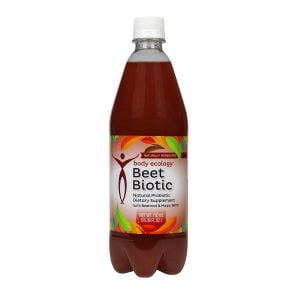Too much of a good thing? Gut help after excessive endurance exercise
Body Ecology’s new, limited edition BeetBiotic™ is a hydrating, performance-supporting probiotic liquid that’s tough to beat. Drinking just a few ounces a day is an easy way to help strengthen your gut.
The athlete who will stop at nothing in pursuit of greatness has nearly become a cliché. They live to compete, love the process, and will do almost anything to gain a competitive edge.
Nowhere is that more apparent than in endurance sports, where every aspect of performance is examined from every possible angle, with every conceivable variable logged, quantified, and analyzed.
Yet increasingly, the competitive edge comes down to not what the athlete does on the course, the field, or in the gym, but to something else: What happens… in the kitchen.
This may be what endurance athletes’ guts are missing
Alongside the endless hours of physical and psychological training, nutrition has become as important to performance as athletic ability and skill development. Yet many athletes begin their nutrition “training” with a handicap that requires attention.
Prolonged participation in endurance exercise at high intensity may alter the gut microbiome. (Gut issues might show up as runner’s diarrhea. More on that below.) A 2017 review in The Journal of Sport and Health reported that along with beneficial adaptations comes an increase in oxidative stress, intestinal permeability, muscle damage, and systemic inflammatory response.1
Other effects can include:
- Blood sugar imbalance.
- Chronic dehydration.
- Elevated levels of stress hormones, like cortisol.
- Poor sleep habits.
- And more.
Low microbiome diversity and overall quality of the microbiome community may also come into play. These and other symptoms contribute to compromised gut function.
While moderate exercise triggers a normal and even beneficial inflammatory response, excessive endurance exercise may promote excessive inflammation. Over time, this can contribute to suppressed immune function.
Overall, excessive exercise can put a strain on the body’s ability to fight infection, recover from rigorous workouts, or simply maintain normal physiologic functions.
What counts as excessive exercise? There’s one defining factor
“You can distinguish healthy enthusiasts from exercise addicts by the following trait,” Ian Cockerill, a University of Birmingham, UK, sports psychologist, has explained.2 “Healthy exercisers organize their exercise around their lives, whereas dependents organize their lives around their exercise.”
During all types of exercise, blood flow is shunted from internal organs to the extremities or working muscles. In prolonged endurance exercise, this can leave the gastrointestinal tract prone to digestive upset and other issues, such as “runner’s diarrhea.” Runner’s diarrhea is characterized by frequent, loose bowel movements during or right after a run.
Among athletes, The Journal of Sport and Health article reported, the main dietary strategy to modulate gut microbiota includes probiotics.1 The administration of different Lactobacillus and Bifidobacterium strains might help maintain a state of general health, enhance immune function, improve gut mucosal permeability, and reduce oxidative stress.3,4
Medical experts are not completely clear on exactly how probiotics support the microbiota. Probiotic supplements remain one of the primary ways to supply the microbiome with beneficial bacteria, which may help to counter the effects of excessive exercise.
Work out smarter, not harder. Your muscles will thank you later.
While probiotics can be an important supplement to a healthy diet, eating foods with beneficial bacteria is perhaps even more important:
- Our favorite fermented foods are the ones that provide a wonderful diversity of beneficial microbes. These include cultured veggies (ideally made with a starter to make them more potent), classic sauerkraut (usually just cabbage and salt and maybe caraway seeds), kimchi and miso, and, of course, homemade kefir and yogurt. (Not the store-bought ones since they’re not nearly as potent as what you prepare in your own kitchen.)
- Kefir is, by far, the easiest of all these to make. Just warm the milk slightly, add your starter, and wait 18 to 24 hours for it to ferment. Nature does all the work, but after that, the flavoring is up to you. These fermented foods provide the sour taste that each delicious meal should include.
- Three ounces of our probiotic liquids are a perfect addition to every major meal. When CocoBiotic™, InnergyBiotic™, or BeetBiotic™ is served in a wine glass and sipped along with your meals, it adds the benefits of wine but without the alcohol. So, these are perfect for children, pregnant women, and even recovering alcoholics, too.
If you’re an athlete, foundational health strategies will provide a competitive edge (and could soothe gut woes, like runner’s diarrhea). These strategies involve managing stress, staying properly hydrated, getting adequate sleep, eating a clean diet that contains fibrous vegetables (the prebiotic “food source” for probiotics) and fermented foods, and supporting gut health with probiotics. And if you’re not an athlete? You still win.
REFERENCES:
- 1. Núria Mach, Dolors Fuster-Botella. Endurance exercise and gut microbiota: A review. Journal of Sport and Health Science. Volume 6, Issue 2, 2017. Pages 179-197, ISSN 2095-2546, https://doi.org/10.1016/j.jshs.2016.05.001.
- 2. Allen, Arthur. “Exercise Addiction in Men.” WebMD, 2007.
- 3. Zhang H, Yeh C, Jin Z, et al. Prospective study of probiotic supplementation results in immune stimulation and improvement of upper respiratory infection rate. Synth Syst Biotechnol. 2018;3(2):113-120. Published 2018 Mar 12. doi:10.1016/j.synbio.2018.03.001.
- 4. Ling X, Linglong P, Weixia D, Hong W. Protective Effects of Bifidobacterium on Intestinal Barrier Function in LPS-Induced Enterocyte Barrier Injury of Caco-2 Monolayers and in a Rat NEC Model. PLoS One. 2016 Aug 23;11(8):e0161635. doi: 10.1371/journal.pone.0161635. PMID: 27551722; PMCID: PMC4995054.









